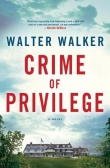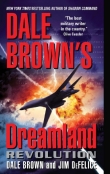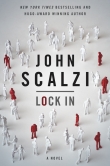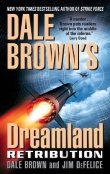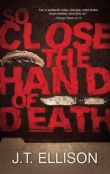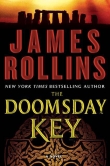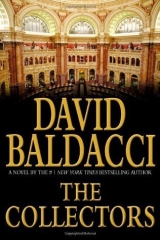
Текст книги "The Collectors"
Автор книги: David Baldacci
сообщить о нарушении
Текущая страница: 20 (всего у книги 27 страниц)
Chapter 50
Stone was sitting in his cottage thinking about his conversation with Marilyn Behan. If she was telling the truth, and he had no reason to think that the bitter woman wasn’t, then Stone had been wrong. Cornelius Behan hadn’t killed Jonathan DeHaven or Bob Bradley. However, he’d apparently stumbled on the method used to kill the unfortunate librarian and, in doing so, had prompted others to murder him. So who else benefited from DeHaven’s death? Or Bradley’s, for that matter? He desperately needed something to connect the dots.
“Oliver?”
He glanced up. Milton was standing in the doorway.
Milton said, “I knocked but no one came.”
“I’m sorry, I guess I was preoccupied.”
Milton carried his laptop as usual and a small briefcase. He put them both down on the desk and drew out a folder. “Here’s what I could find on Bradley’s staff.”
Stone took the papers and read through them carefully. There were numerous documents highlighting Bradley’s political career, including the House Intelligence Committee that he’d chaired for years.
“Bradley was a very capable politician, and he instituted many good reforms in the intelligence fields,” Milton said.
“Which maybe got him killed,” Stone commented. “Nice reward.”
Stone started going through the backgrounds and photos of both Bradley’s congressional office staff and his underlings on the intelligence committee. As soon as he finished, Annabelle and Caleb arrived. Stone told them and Milton about his encounter with Marilyn Behan.
“Well, that certainly kills the theory about Behan’s involvement in Jonathan’s death,” Caleb said.
“Appears so,” Stone said. “What did you two find out today with the tapes?”
“Well, our initial hunch that we might see someone coming in or out of the vault that might be helpful didn’t play out. But we did find something else that might be very important.” Annabelle explained about the sleight of hand pulled by Jewell English.
“You’re sure about this?” Stone asked, looking puzzled.
“Trust me, I’ve seen that move a million times.”
And done it yourself at least as often, Stone thought. He turned to Caleb. “What do you know about this woman?”
“Just that she’s an elderly widow, a regular patron, a lover of old books, very nice and enthusiastic and …” He turned red.
“And what?” Stone asked.
“And she’s always hitting on me,” he said in a low, embarrassed voice.
Annabelle had to hold back a laugh.
Stone said, “But presumably, you know all these things about her because she told them to you. They’re not verified.”
“That’s true,” Caleb conceded.
“So why the glasses switch?”
“Oliver, it could simply be that she didn’t want to give me those because they’re special to her for some reason. She lent me another pair so I wouldn’t read too much into it.”
“I wouldn’t read too much into it either, Caleb, except one wouldn’t expect elderly widows who frequent rare book reading rooms to have such exceptional sleight–of–hand skills. If she didn’t want you to wear those glasses, why not just say so and hand you the spare pair?”
Caleb started to say something and then stopped. “I don’t have an answer to that.”
“I don’t either, but I’m starting to believe that we need to find an answer if we’re going to discover what happened to Jonathan DeHaven.”
“You can’t possibly believe that sweet old Jewell English had anything to do with Jonathan’s death,” Caleb protested.
“We can’t rule that out right now. And Behan was killed because he guessed how DeHaven died. I think he discovered that the gas cylinders at the library had been deliberately mislabeled. That may be why he came to the reading room asking questions and wanting to look at the vault, Caleb. He was fishing for information as to why DeHaven might have been killed. Remember, he wanted to know if DeHaven was friendly with everyone at the library. He wasn’t looking to pin the murder on someone else, he genuinely wanted to know if DeHaven had any enemies.”
“In other words, the key isn’t Behan, but DeHaven, and maybe something at the library?” Annabelle said.
“Possibly,” Stone replied. “Or something in his private life.”
Caleb flinched at this remark but remained silent.
“But where does the murdered Bob Bradley figure into all this?” she asked. “You said you thought that was connected.”
“We know that Bradley was killed by a bullet from a rifle fired through a window in another building. Behan died in the exact same way. That can’t be a coincidence. Indeed, it could very well be the exact same killer. Professional assassins like to use the same method of killing because they become so proficient at it. It reduces the chances of an error in the assignment.”
“You sound like you know a lot about that sort of thing,” Annabelle said.
He smiled innocently. “As Caleb can tell you, I’m a voracious reader of thriller novels. I find them not only entertaining but informative.” He looked at Caleb. “Is there any way we can get a look at the woman’s glasses without her knowing?”
Caleb said sarcastically, “Sure, we can burglarize her home in the middle of the night and steal them.”
Stone said, “Good idea. Can you find out where she lives?”
Caleb sputtered, “Oliver, you can’t be serious.”
“I might have a better way,” Annabelle said. They all looked at her. “Does she come into the reading room on a regular basis?”
“Fairly regularly.”
“If she sticks to that schedule, when is she due next?”
Caleb thought quickly. “Actually, tomorrow.”
“Fine. I’ll go to the library with you tomorrow. You point her out to me and then let me handle it.”
“What are you going to do?” Caleb demanded.
Annabelle rose. “Give her a taste of her own medicine.”
After Annabelle had left, Caleb said, “I couldn’t talk in front of her obviously, but, Oliver, what if all this has something to do with the Bay Psalm Book? It’s incredibly valuable, and we can’t find out where Jonathan got it. Maybe it’s stolen and maybe someone else wants it. They could have killed Jonathan to get it.”
“But they didn’t get it, Caleb,” Stone countered. “The person who knocked out Reuben was in the house. They could have broken into the vault and taken it then. And why kill Cornelius Behan? Or Bradley? They could have no connection with the Psalm Book. Behan didn’t even know DeHaven had a book collection. And there’s no evidence that Bradley even knew your colleague at all.”
After a depressed and confused Caleb had left, Milton and Stone sat talking while Stone flipped through the file on Bradley’s staffers. He said, “Michael Avery went to Yale, clerked for a Supreme Court justice, did a stint at NIC before going on the intelligence committee staff. He moved with Bradley when he became Speaker.” He looked at some of the other pictures and bios. “Dennis Warren, another Yalie, was at DOJ early in his career. He was Bradley’s chief of staff and kept that position when Bradley became Speaker. Albert Trent was on Bradley’s intelligence committee staff for years; a Harvard–educated lawyer and CIA employee for a time. They’re all Ivy Leaguers, all highly experienced. It looks like Bradley had a first–rate team.”
“A congressman is only as good as his staff, isn’t that the old saying?”
Stone looked thoughtful. “You know, one thing we’ve never really looked at were the circumstances of Bradley’s murder.”
“How do we remedy that?” Milton asked.
“Our lady friend is very good at impersonation.”
“The best.”
“How would you like to do a similar run with me?”
“I’m your man.”
Chapter 51
Albert Trent and Roger Seagraves were meeting in Trent’s office on Capitol Hill. Seagraves had just handed Trent a file with some briefing material. Trent would make a copy of the file and put it in the committee’s intake system. Embedded within the original file were critical secrets from the Pentagon detailing U.S. military strategies in Afghanistan, Iraq and Iran. Trent would use a pre–agreed decryption method to ease these secrets from the pages. With this business finished, Seagraves said, “Got a minute?”
They strolled around the Capitol grounds. “Boy, Roger, you got lucky with Behan, and the other guy getting blamed for it,” Trent said.
“Understand one thing, Albert: Nothing I do is tied to luck. I saw an opportunity and took it.”
“Okay, okay, no offense meant. You think the charges will stick?”
“Doubtful. I’m not sure why he was there, but he was watching Behan’s house. And he’s buddies with Caleb Shaw at the reading room. And on top of that, the guy I nabbed and ‘talked’ to, this Oliver Stone, is with the same group.”
“Shaw is DeHaven’s literary executor. That’s why he’s been going to the house.”
Seagraves looked disdainfully at his colleague. “I know that, Albert. I did a face–to–face with Shaw to set up a future move if it becomes necessary. It’s not just books they have on their minds. The guy I interrogated used to be at CIA in a very special capacity.”
Trent exclaimed, “You didn’t tell me that.”
“You didn’t need to know, Albert. Now you do.”
“Why do I need to know now?”
“Because I said so.” Seagraves gazed at the Jefferson Building, where the Rare Books reading room was located. “These guys have also been snooping around Fire Control, Inc. My man there said the paint on one of the cylinders they pulled from the library had been rubbed off. So they probably know about the CO2.”
Trent turned pale. “This is really not looking good, Roger.”
“Don’t start sweating yet, Albert. I’ve got a plan. I’ve always got a plan. We got the last payment in. How fast can you move the new stuff?”
He checked his watch. “Tomorrow at the earliest, but it’ll be tight.”
“Make it happen.”
“Roger, maybe we should just shut it down.”
“We’ve got a lot of customers to service. That wouldn’t be good business.”
“It also wouldn’t be good business to go to prison for treason.”
“Oh, I’m not going to prison, Albert.”
“You can’t know that for certain.”
“Yes, I can. Because they don’t put dead men in jail.”
“Okay, but we don’t have to go that route. Maybe we should think about at least slowing down a bit. Let things cool off.”
“Things rarely cool down after they heat up. We’ll just keep doing what we’re doing, and like I said, I have a plan.”
“Care to share it?”
Seagraves ignored the question. “I’m doing another pickup tonight. And this one might top ten mil if it’s as good as I think it is. But keep your eyes and ears open. Anything looks strange, you know where to find me.”
“You think you might have to, you know, kill again?”
“Part of me sure hopes so.” Seagraves walked off.
• • •
Later that night Seagraves drove to the Kennedy Center to attend a performance of the National Symphony Orchestra, NSO. Perched on the edge of the Potomac, the plain, boxy Kennedy Center had often been declared one of the country’s blandest memorials built in honor of a deceased president. Seagraves didn’t care about the aesthetics of the structure. He didn’t care about the NSO either. His handsome features and tall, muscular physique drew stares from many of the women he passed as he walked down the hall toward the auditorium where the NSO would be performing. He took no notice of this. Tonight was strictly a working night.
Later, during the brief intermission, Seagraves joined other patrons in going outside the auditorium to get a drink and gaze over the memorabilia for sale. He also made a pit stop in one of the men’s rooms. After that, the lights dimmed, signaling the start of the last part of the program. In a crush of people he made his way back to the theater.
An hour later he had a drink at a late night bar across from the Kennedy Center. He pulled his program out of his side jacket pocket and studied it. This was not his program, of course. It had been slipped into his pocket during the crush of the crowd getting back into the theater. There was no possibility that anyone could have seen this. Spies who skirted crowds were always caught. For that reason, Seagraves embraced the masses for the protective cover they provided.
Back home in his workshop, Seagraves finessed the secrets from the pages of the “program” and put them in the proper format to send along to Albert Trent the next time he saw the man. He smiled. What he was staring at was no less than the final pieces he needed for the decryption keys for high–level diplomatic communications emanating from the State Department to its overseas branches. Now he was thinking $10 million was too cheap. Maybe $20 million. Then Seagraves decided he would start at $25 million to leave himself some wiggle room. He conducted all his negotiations over various prearranged Internet chat sites. And the secrets were only delivered once the money had been wired into his numbered account. He had taken the very reasonable position of not trusting anyone he did business with. Yet he was kept honest on his end by the efficiencies of the free market. The first time he collected money without delivering the merchandise, he would be out of business. And probably dead.
The only possible thing that could upset that plan was some old guys who had a habit of snooping. If it had only been the librarian, he wouldn’t have been too worried. But thrown into the mix was the Triple Six, a man not to be taken lightly. Seagraves could sense another storm brewing. For that reason, when he’d earlier kidnapped Stone and tortured him, he’d taken one of his shirts from the man’s cottage; to add to his collection, if the need arose.
Chapter 52
Stone and Milton arrived at the Federalist Club around ten the next morning.
They gave their request and were escorted into the manager’s office. He looked at their crisp, official–looking identification cards that Milton had run off his laser printer the night before.
“You’ve been hired by Bradley’s family back in Kansas to investigate his death? But the police here are handling it. And the FBI. They’ve all been here, numerous times,” the manager added in an annoyed tone.
“The family wanted its own representation, as I’m sure you can understand,” Stone said. He and Milton were dressed in suit jackets, ties and dark slacks. Milton’s longish hair was hidden under a fedora that he’d declined to remove. “They don’t feel as if adequate progress is being made.”
“Well, since the police haven’t caught anyone, I can’t argue with that opinion.”
Stone said, “You can call them if you want to verify our representation of their interests. Mrs. Bradley is out of the country, but you can talk to the family’s local lawyer in Maryland.” On the card was Milton’s phone number. He’d recorded a message posing as the attorney in the off chance the manager took them up on the offer.
“No, that’s all right. What would you like to know?”
“Why was Bradley at the club that night?”
“It was a private celebration, for his election as Speaker of the House.”
“I see. Who arranged it?”
“His staff, I believe.”
“Anyone in particular?”
“Not that I can remember. We received instructions by fax. I assumed it was a surprise of some sort.”
“And he was killed in the front drawing room?”
“We call it the James Madison Room. You know the Federalist Papers thing. I can show you if you like.”
He led them to the large room fronting the street. Stone looked out the broad bay window at the upper story of the building across the street. To his skilled eye it was a perfect shot trajectory, which clearly demonstrated not only advance intelligence but someone on the inside.
Following through on this thought, Stone asked, “And he came in here why?”
The manager was wiping a speck of dust off the marble fireplace mantel. “Oh, it was for the toast, in his honor.” He shivered. “It was ghastly. Senator Pierce had just finished speaking when Bradley was shot. It was absolutely horrifying, blood everywhere. A very expensive Persian rug was a total loss, and blood even seeped into the wood. That cost a small fortune to have bleached out and then restained. The police just let us do it recently. We couldn’t even cover it because they said it might taint the evidence. People had to walk by looking at it. Cut down on membership traffic here, I can tell you that.”
“Who owns the building across the street?” Milton asked.
“I don’t know. I assume the authorities have found out by now. It used to be a private home and then an art gallery. It’s been just sitting there for about five years now, a real eyesore, but what can you do? I had heard, though, that it was being renovated. Into condos, I think. They just hadn’t started the work yet.”
“So who summoned Bradley into the room for the toast?” Stone asked.
The manager thought for a moment. “There were so many people here, I’m not sure. I really wasn’t involved in that part of the celebration. I was standing by the window when the shot came. I think I actually felt it whiz by my ear. I was limp for days after.”
“I’m sure. Anyone else that might be able to tell us anything?”
“Well, one of the waiters, and the bartender who worked the event. They’re both in now if you want to talk to them.”
The bartender knew nothing. However, the waiter, Tom, said, “It was one of his staff, I think, who got everybody together for the toast. At least that’s what I recall. I helped pull people in from the other rooms, and then they went and got Congressman Bradley.”
“Do you remember who it was? The staff person?”
“No, not really. There were a lot of people. And I don’t think he ever said his name.”
“So it was a man?” Tom nodded. Stone held up a copy of pictures of Bradley’s staff. “Recognize anyone? How about him?” He pointed to Dennis Warren. “He was Bradley’s chief of staff. It would make sense for him to organize the toast.”
“No, it wasn’t him.”
“Him,” Stone said, pointing to Albert Trent. “He was also high up on Bradley’s staff.”
“Nope.” The waiter ran his gaze down the photos, finally stopping at one. “That’s him. Now I remember. Really efficient.”
Stone stared at the photo of Michael Avery, who’d served on Bradley’s staff at the intelligence committee.
As they were leaving the Federalist Club, Milton asked, “What now?”
“Now we talk to some people who worked for Bradley.”
“Not Avery? That would tip him off.”
“No, but Trent or Warren.”
“But we can’t tell them we’re investigating on behalf of Bradley’s family; they’d probably know we were lying.”
“No, we’re going to tell them the truth.”
“What?”
“We’re going to tell them we’re investigating the death of Jonathan DeHaven.”
• • •
Dennis Warren was at home when Stone called, after looking him up in the directory, and he agreed to meet with them. Over the phone he’d said that while he’d heard about DeHaven’s death, he didn’t know the man. He’d commented ruefully that “I don’t even have a library card, I’m ashamed to admit.”
Milton and Stone rode the Metro to Warren’s Falls Church, Virginia, home. It was a modest place in an older neighborhood. It was clear that Warren was not the outdoor or handyman type. His lawn was full of weeds, and the house was desperately in need of painting.
However, inside, the place was cozy and comfortable, and, despite Warren’s comment on not having a library card, the shelves were full of books. Stacks of worn tennis shoes, varsity jackets and teen–related junk showed that he was also a father.
Warren was a tall, portly man with thinning brown hair and a wide pockmarked face. His filmy, translucent skin bespoke of decades laboring for his country under fluorescent light. He led them through the hall to the living room.
“Don’t mind the mess,” Warren said. “Three sons ages fourteen to eighteen means your life and home are not your own. I can stand up in a meeting and present a cogent argument on complex geopolitical intelligence strategies to the Joint Chiefs or the secretary of defense, but I can’t seem to get any of my sons to bathe on a consistent basis or eat anything other than cheeseburgers.”
“We know you were on the intelligence committee staff,” Stone began.
“Right. I moved with Bradley when he became Speaker. Currently, I’m unemployed.”
“Because of his death?” Milton said.
Warren nodded. “I served at his pleasure, and it was a pleasure serving him. He was a great man. A man we needed in this day and age; rock–solid and honest.”
“You couldn’t stay with the intelligence committee?” Stone asked.
“Not really an option. Bradley wanted me to come with him, so I did. And I wanted to go. There’s only one Speaker of the House and only one chief of staff to a Speaker. Lot of action and everybody returns your phone calls. Plus, the new chairman of the intel committee had his own people he wanted to move up. That’s how it is on the Hill. You’re attached to your member’s coattails. And when those coattails move or go away, well, that’s why I’m home in the middle of the day. Good thing my wife’s a lawyer, or we’d be up a creek financially. To tell the truth, I’m still getting over the shock of what happened and haven’t really started looking for another job.” He paused and eyed them closely. “But you said you were investigating this DeHaven guy’s death? What’s that got to do with Bradley?”
“Maybe nothing or maybe a lot,” Stone said vaguely. “You’ve heard about Cornelius Behan’s murder?”
“Who hasn’t? Pretty embarrassing for the wife, I’d say.”
“Yes, well, DeHaven lived next door to Behan, and the killer used DeHaven’s house to shoot from.”
“Damn, I hadn’t heard that. But I still don’t get the connection to Congressman Bradley.”
Stone admitted, “I’m trying to connect the dots myself, frankly. Were you at the Federalist Club that night?”
Warren nodded slowly. “It was supposed to be a tribute to the old man and ended up being a nightmare.”
“You actually saw it happen?” Milton asked.
“I had that great misfortune. I was next to Mike, Mike Avery. Senator Pierce had just finished a nice toast and bam, shot came out of nowhere. It all happened so fast. I had my glass of champagne next to my lips. Spilled it all over me. It was awful. I was sick to my stomach, a lot of people were.”
“You know Avery well?”
“I should, we worked together, day and night, for ten years.”
“Where is he now?”
“Moved with me when Bradley became Speaker. He’s out of a job now too.”
“We understand that he was the one who put together the event at the club and arranged for the toast.”
“No, he didn’t. Mike and I drove over there together. We were just part of the guest list.”
“We were told he was getting people in the room for the toast.”
“So was I. We were just helping out.”
“Who were you helping?”
“Albert. Albert Trent. He was the one who suggested the toast. Albert was always thinking of stuff like that. I’m just a poor wonk with limited social skills.”
“Albert Trent? Did he put the whole event together?”
“Don’t know. But he was certainly working the room that night.”
“Is he out of a job now too?”
“Oh, no. Albert stayed behind at the intel committee.”
“But I thought you said you followed your congressman?” Stone said, puzzled.
“Normally, you do. But Albert didn’t want to leave. Bradley wasn’t happy about it, I can tell you that. Albert had cut some deal with the new intel chairman coming up to be his top aide. Albert has a way of making himself indispensable. But there’s a lot to do at the Speaker’s office, and not having Albert left us shorthanded. I’m not telling tales out of school. That was public knowledge.”
“But Bradley let him have his way?”
Warren smiled. “You obviously didn’t know Bob Bradley. Like I said, the guy was incredibly decent, honest, hardworking, but you don’t get to his position in life without being tough as hell and persistent. And the man didn’t like having a subordinate buck him. Dollars to doughnuts, Albert was going to end up in the Speaker’s office sooner rather than later.”
“But with Bradley dead, that became a moot point?”
“Of course. Me and Mike tried to do the right thing, and we’re unemployed. Albert bucks the old man and he’s sitting pretty. And Mike’s got four kids and his wife stays home. Trent’s single and no kids. Tell me how that’s fair.”
After they had left, Milton said, “I know, everything I can find on Albert Trent.”
Stone nodded. “Everything.”
“That seems a pretty clear motive for murder, though. I’m surprised the police haven’t jumped on it. Warren didn’t even seem to catch it.”
“What motive?” Stone asked.
“Oliver, it’s obvious. If Bradley lives, Trent has to leave the intelligence committee. If he dies, Trent gets to stay where he is.”
“So you think the man murders the Speaker of the House to avoid changing jobs? And he didn’t pull the trigger because he was at the club. So he’d have to hire a hit man to do it for him. That seems a little extreme to keep a midlevel government position. And like Warren said, the Speaker’s office is far more prestigious.”
“Then there has to be something more.”
“Agreed. But right now we don’t know what that is.”
• • •
Inside the house, Dennis Warren picked up the phone and spoke with his friend and former colleague Mike Avery. Then he punched in a second number.
“Albert? Hey, it’s Dennis. Look, sorry to bother you at work, but some guys were here asking some weird questions. I called Mike Avery too, to give him a heads–up. It’s probably nothing, but I thought I’d call you anyway.”
Trent said, “I appreciate that. What exactly did they want to know?”
Warren recounted the conversation and then added, “I told them you’d organized the toast for Bob and that you’d stayed behind at the committee.”
“What did they look like?”
Warren described Stone and Milton. “Do you know them?”
“No, not at all. That is weird.”
“Well, again, I just thought I’d give you a heads–up. Hope I didn’t say anything I shouldn’t have.”
“I have no secrets,” Trent replied.
“Hey, Albert, if anything opens on the committee staff, let me know, willya? I’m tired of twiddling my thumbs.”
“Will do and thanks for the info.”
Albert immediately left his office and made a call from a pay phone and arranged to meet with Seagraves outside the Capitol later.
When Seagraves arrived, Trent said, “We’ve got a problem.”
Seagraves listened and said, “Well, their next move is obvious.”
“You’ll take care of it?”
“I always take care of it.”
